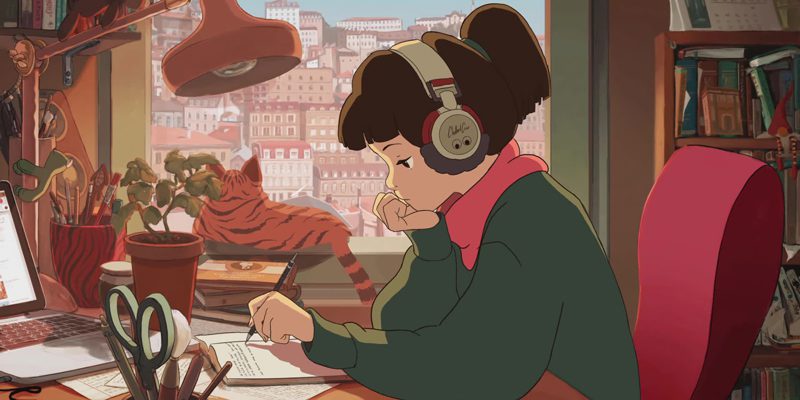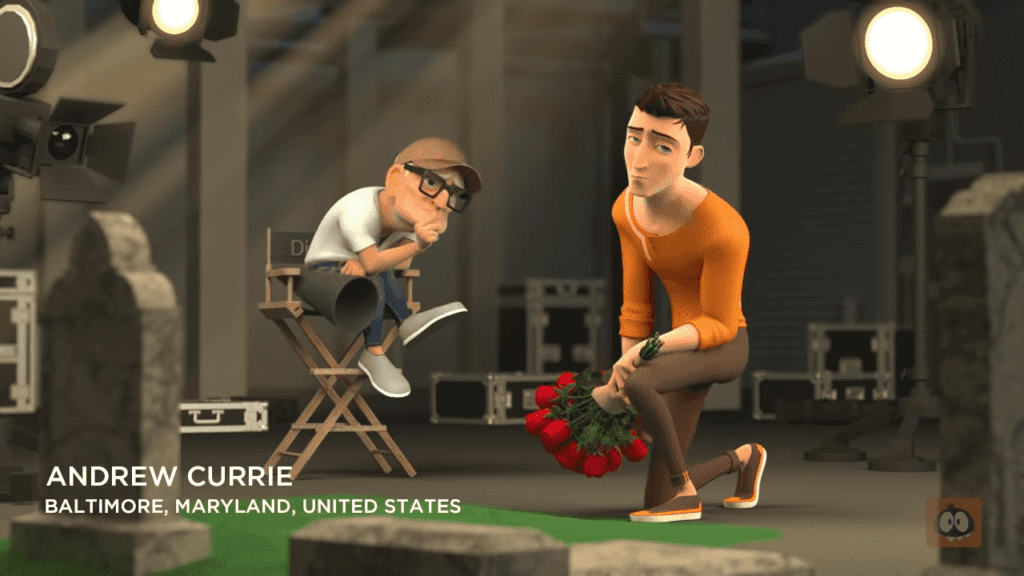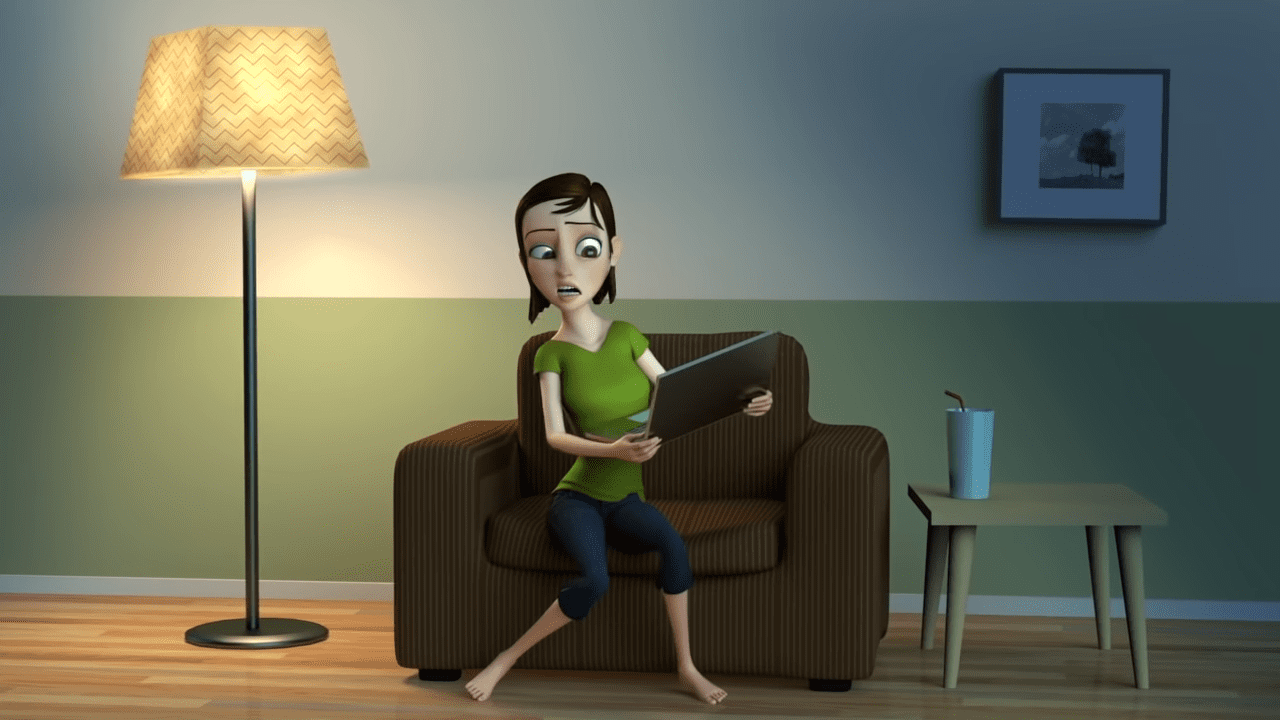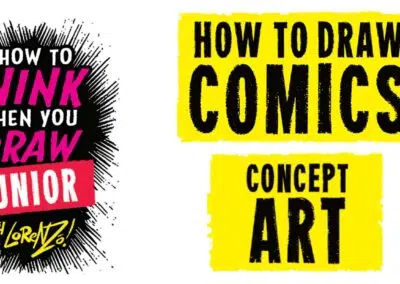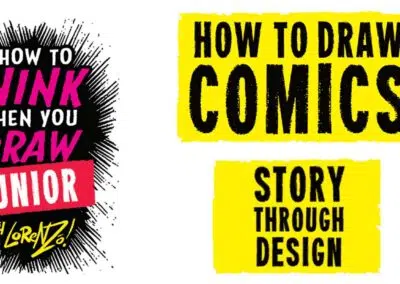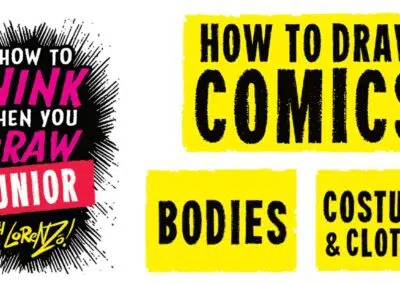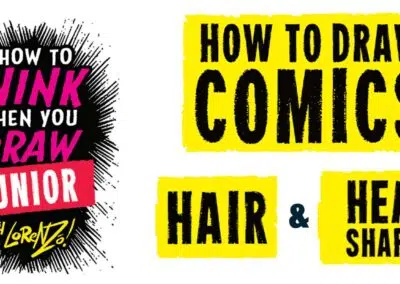If you’re an art student, you know where the header image is from.
I’ve never “covered” an article before, but for back-to-school, Wacom has partnered with Animation Mentor, an online animation school that as the name implies, lets you pick a mentor who will be your guide through the process of learning to animate.
Animation Mentor’s core animation program has six courses: Animation Basics, Body Mechanics, Advanced Body Mechanics, Introduction to Acting, Advanced Acting, and Polishing and Portfolio. They teach key parts of the animation pipeline, with classes in animation, storyboarding, and 3D modeling, and the mentors are all industry professionals working for companies including Pixar, Dreamworks, and Industrial Light & Magic. And they have the most consistently glowing reviews I’ve seen for an online school. Here are a couple quotes I pulled from forums and socials where I was confident enough the posters didn’t have a financial incentive:
“It is a fantastic program. While there are multiple schools out there now, AM still commands a great series of lectures, mentors who work in the industry, and spot on feedback,” says daarand on Reddit, adding, “This industry is awesome and I would trade it for nothing. I got here directly because of AM.”
“I think they focus on totally the right things and at the core they are truly motivated to help people become better animators not just learn the tech,” says Mark Dygert via the Polycount forums. “The industry needs more animators who can act. Period. AM will give you that.”
If that’s not enough, just look at last year’s highlight reel.
And if that’s not enough, over forty of their alumni worked on Into the Spider-Verse. Convinced yet? They just extended their fall application deadline to August 21, or you can apply for the Winter Term (courses start January 4, 2021).
They also have a fascinating roster of bonus workshops for August, including Game Animation Fundamentals, Creature Animation, and Cartoony Animation for 3D Animators, which you have until August 2 to register for.
Anyway, the article we’ll be discussing today is from their blog, and it’s called:
4 Tips for Working from Home—How to Stay Positive
…Which is selling themselves short, because it’s actually fifteen tips, they’re just organized into four categories. It’s like anti-clickbait when you think about it.
The article’s comprised of quotes and advice from their students and teachers on their best tips for staying focused while working on projects in quarantine. They’re geared toward people working in the industry, but since it’s back-to-school time and a lot of us (the lucky ones) will still be working from home, let’s talk about how their advice can be adapted for art students.
1. Eliminate as many distractions as you can
Paul Barragan’s Lucifer—as the caption suggests, winner of AM’s 11-second short film contest. From Youtube
—
Distractions are common for us all. The one way that I’ve found to overcome these is by having a to-do list and to go item by item. I don’t know about most of you, but for me setting times and deadlines helps me focus.
Peter Robie, Body Mechanics
Body mechanics? Is that like the Organic Mechanic from Mad Max? Anyway, setting a schedule lets you differentiate between study and personal time, making you more productive during the former. Deadlines create the same effect, but with an added sense of urgency: If you’re not feeling it enough, some guides recommend you punish yourself when you miss them by denying yourself ice cream or whatever, but whether or not you choose to do this is up to you; it’s about the principle.
To-do lists are a load off your mind because they prevent you from having to carry around unnecessary information in the back of your mind. Be flexible with item order, but once you’ve started on a task, keep doing it either until it’s done or until you can’t for that day anymore instead of trying to multitask. Part of the beauty of to-do lists is that if you don’t get everything done in one day, it’s saved there for the next. (And there’s a lot of satisfaction in going back through your old lists and checking off things you’ve accomplished but forgot to check off when you did them.)
There are too many to-do list apps to name, but Google Keep is my personal favorite because it auto-connects to your phone and Chrome account, making it one less login to keep track of.
—
I get easily distracted sometimes, but I try to set out a block of time for my homework so that I can force myself to sit down during that time and get things done. I’ll turn off my phone and let my mom know that I’m working so I don’t get interrupted.
Erin Taylor, Introduction to Acting
Pretty much every article on productivity says to install a website blocker, disconnect your internet, or turn off your smartphone. I mentioned FocalFilter in my last article on working from home: It and plenty of other web filters are a way to block problem sites for a set time period without having to resort to more drastic measures. Why this works: Most social-media-checking is habitual, almost involuntary. You don’t check it because you want to, you do it because your hands automatically type that URL once every 15 minutes.
Why do you do this? To check your likes and shares for validation, of course, but more sneakily, we can justify it to ourselves as educational due to the off chance we might learn something useful. You can stumble across some incredibly valuable information on social media if you follow the right people, but it’s like a slot machine: Mostly bad jokes and ignorant hot takes, but with just enough solid content, dispensed just often enough, to keep you pulling the lever.
In fact, you can remove most of the worst distractions with one simple rule, and you’ll be amazed at how much mileage you can get out of it:
Block anything with a news feed.
That means Facebook, Twitter, Instagram, any clones of the aforementioned, Reddit, news sites, email, YouTube if you don’t need it for studies, and Discord, because what is chat if not a news feed on uppers?
Even if you keep other diversions, you’ve eliminated the single biggest distraction trigger in one fell swoop, and it’s surprising how much you don’t miss it. Your thought process goes something like: “I should check Facetwitagram to see if I got any responses to my— Oh, I can’t. Back to work I guess.”
This also separates your computer time into “working” and “non-working,” like a Pomodoro timer that kills two birds with one stone. I find 30 minutes to be the best time interval for that reason. If you don’t overdo by setting it for too long, you’ll barely notice it’s there.
—
I get easily distracted. Luckily, since I’m techy, I put my phone away in another room, [but] I have a smartwatch so I still get notifications if anything is important. Otherwise I can look at my watch real quick and keep working on my assignment.
Nick Ganser, Body Mechanics
Leaving it in a common area might be weird if you have roommates, but at the very least, turn it upside-down and place it on a surface that isn’t your desk.
—
2. Connect with other people
By Florian Becker, from AM’s 2016 Student Showcase
Let’s not sugarcoat it: We’re going to be in some form of quarantine for the long haul. Building sustainable systems of online communication to keep up with your friends should be a priority.
—
The lack of a social environment can kill productivity. Staying in regular contact with peers via Skype, Google Hangouts, or other services where you can share your work can help you keep track of your progress.
Adam Gillespie, Alumnus
Excellent advice—after all, he made it all the way through the program, so he must know his stuff.
Despite the image of the solitary artist who spends all their time locked in a dark room laser-focused on a screen, there’s a vital social aspect to art. Why do you think so many of us do so much free work just to share it with our favorite fan communities? But finding people to work with is taking it to the next level and is a major incentive to draw regularly.
Thankfully, there are more interest-based audio and video chat groups than ever, so finding them is a breeze. If your school or circle of personal friends don’t have their own, you can always stream your art on Discord or ask any communities you belong to if they have any you can join. Often, they’ll regularly ask to see the progress on your work, which will motivate you to keep working. Just having periodic reminders that people remember your work and are interested in your progress works wonders.
—
Don’t let technology get in the way of communicating with others. If you’re having trouble ask for help.
Fátima Malo Torres Trueba, Advanced Body Mechanics
We’re advanced now: I assume this is where they get into tuning, machining parts, maybe working with imports?
Asking for help is difficult for a lot of artists, but it doesn’t have to be. Not wanting to bother people can hinder your progress, especially since many artists love talking shop, so if they’re not too busy at the moment, sharing their time might not be as much of a nuisance as you might think. Feel free to reach out to artists online whose work you admire and ask them how they draw X. The worst they can do is not answer. Most of them aren’t as famous and inaccessible as you think, and although some will be dismissive, others will do their best to help you if they can. Just don’t keep asking to the point of harassment or anything.
And even outside of school, if you know any friends who do the same kinds of art as you, now is a great time to collaborate with them on projects.
—
*BREATHE* It’s not as bad or hard as it may appear. Reach out to others for help. You are NOT alone in this. Hop on Zoom or FB groups, communities online can be great resources for help. Be in contact with your teachers, let them know what’s going on. Most good teachers, by nature, teach because they care. Remember that.”
Elizabeth Kruger, Body Mechanics
Anyway, communicating with instructors when you’re stuck or running late on a project is crucial. If a teacher treats a struggling student as a slight against them or the class, that’s a problem with their attitude, not yours. A good one will try to work with you to improve since they have a vested interest in your success.
—
Create or find a community with colleagues or peers who are doing the same things as you are; facing the same challenges, obstacles, or projects. Keeping a line open and a dialogue going with other people is crucial, whether that is for support, socializing like water cooler talk, or even to ask questions and get feedback. Remember, you will get as much out of it as you put into it.
Whitney Strouth, Alumni
As an aside, Animation Mentor itself is set up to facilitate this. Both your mentors and your other students can view your work, critique it, and redline any anatomy or motion mistakes.
—
3. Be honest about your limitations. What’s something you struggle with?
—
Outside distractions from others in the household. We now have a set quiet time.
Jennifer Arnold, Advanced Body Mechanics
This is useful for all the same reasons I covered in the section about website blockers. But a quick aside for neuro-atypical people, such as those on the ADD spectrum: You might well have a hard time focusing with quiet alone. Instrumental music on headphones can provide enough background stimulation to do the trick. But either way, setting aside a stretch of time long enough to shift your brain into gear is crucial for productivity. It’s even more important for us than neurotypicals because it takes longer than average to calm down to the point where we can enter flow state. See my article on this.
—
Boredom or lack of inspiration. Whenever this happens, the work that I do will have a drastically lower quality than planned, since I don’t feel that motivation to do it. Normally whenever I feel this way, I take a break from work, watch a video, rest, take a shower. Or do anything to refresh my mind and try to feel relaxed. Then I get back to it with a fresh mind.
Bryan Soto, Advanced Body Mechanics
This can be counterintuitive because the last thing you might feel like doing when you have a deadline bearing down on you is stopping. But as I’ve said in other ways throughout the article, delineating work time and off time is important to maximizing productivity during work time. And the problem of boredom can be exacerbated when you’re working from home because having unlimited desk time cuts down on the amount of variety in your schedule, and not having anyone to tell you when to stop can cause your work to become monotonous as it takes over your life. People with heavy course loads have to watch out for this in particular.
—
Snacks and boredom 🙂 The only way upwards for me unfortunately is practice. It does get easier, you just have to build a new routine and be as strict as possible about it for at least the first week. Then it’ll start to be a habit.
Taylor Smariga, Polishing & Portfolio
Since we’ve covered boredom enough, let’s talk snacks. A large part of building better habits is changing your environment so you don’t have to waste your willpower on non-essential decisions. If you’re worried about eating too many salty or sugary snacks, simply buy other kinds. For example, corn chips and salsa can fulfill the same craving as Lays or microwave popcorn while being healthier. And wrap snacks up and take them back to the pantry when you’re full so you won’t continue eating out of habit.
—
Distractions from my dogs and wife. For my wife, I try and have blocks of time set aside for breaks so we can spend time together. For my dogs, I try and take them on walks during my breaks to tire them out, and have an area for them to rest in the same room as me.
Stephen Arends, Polishing & Portfolio
Or you can trade your dogs for cats, who have built-in affection timers.
—
4. Be patient with yourself
—
Be patient if things don’t work with platforms or different internet resources, find another way that works for you, like calling to your classmates or email your teacher/boss for clarifications.
Laura de Haro, Body Mechanics
One of the most helpful pieces of study advice I’ve ever heard is from Tony Zhou, formerly of the Youtube channel Every Frame a Painting: Do more offline research.
“A huge percentage of the Internet is the same information, repeated over and over again,” he says. “They call it aggregation but it’s really just a nicer way to say regurgitation. So go to the library. Read books … You’re immediately breaking out of the online cycle of repetition, and your work will improve immediately.”
But a lot of the most helpful information isn’t published at all: It’s in the heads of other artists and animators who’ve been at their craft much longer than you. A lot of it can only be accessed by talking to them directly. (Which is why that’s kind of Animation Mentor’s whole deal.)
BTW: Jokes aside, body mechanics is the study of how muscles propel motion. Here’s Animation Mentor’s own breakdown of it.
—
Give it some time, it will become [second nature to] you.
Eric Thompson, Alumni
This is deceptively simple but crucial advice. When you’re struggling with your studies, as with any work, it can be easy to fall into the trap of thinking that it will always be this way and that it’ll never get easier. …Although I find this comes in waves. There are times when it will get easier and the art will flow naturally. During these times, you might get lulled into thinking you’ve finally mastered art school and everything will be smooth sailing from now on. Then your next project is brutal and you’re just as certain that you’ve lost your touch and will never be good at it again. In reality, these are all just normal ebbs and flows, and eventually you get to a point where you can handle the work even if it’s hard.
—
My best advice is just do the best you can. Be patient with yourself as you transition. Like anything, the more you do something, the easier and more second nature it becomes.
Taylor Tubbs, Animation Basics
You’ve been told not to beat yourself up for being good enough, but there’s an even more insidious form of it you might be engaging in: beating yourself up for not always having been good enough, or fearing you might never be good enough, no matter how much you study and practice. Let’s call this set of beliefs the shame of mistakes past, present, and future.
“Sure I’ve improved, but my work is just mediocre where my old work was terrible. I can’t believe I ever thought I was a good artist!” This is the shame of mistakes past.
“I’ve been putting all this work into improving, so why aren’t I better!? I should be further along than this by now!” This is the shame of mistakes present.
“I’ve procrastinated on my project to this point, what’s the point in trying to play catch-up now? I might as well write it off as a loss and give up.” This is the shame of mistakes future.
These thoughts can be your biggest roadblocks to progress, and worst of all, you often don’t even realize they’re what you think. It takes consciously forcing yourself past them before you can become confident that you can handle your courseload and before good habits can take hold. Because if you don’t deal with these beliefs, you’ll break those habits before they can form.
Every artist looking at their old work, 30,000 BC to 2020 AD (colorized). By AM student Aaron Sutherland
—
There’s probably going to be issues and things may not work smoothly all the time. That’s perfectly fine. Just try to do the best that you can and it will get easier with time.
Maria Vito, Alumni
—
More Info
Despite this article being aimed at students, for more general work advice, see:
- My article on self-care and calming COVID anxieties.
- And this one on staying productive while working from home.
- Or this one by anime artist Bitsy Tandem on the same thing.
- “Preparing for Onsite and Online Learning in the Fall – A Panel Discussion”
Or you can just view all our articles in the back-to-school category.
Finally, if you’re feeling like you can’t make it through any more quarantine, remember that the lo-fi girl has been stuck at her desk for two years.
At Wacom, we’re fans of lofi hip hop radio too! 🙂
Original artwork by Juan Pablo Machado recreated by Shireen (and her pup, Jessie) from our social media team.
About the Author
CS Jones is a Philadelphia-based writer and illustrator who didn’t do that well in school himself, so listening to him is optional. His writing’s best seen at thecsjones.com, and his art at @thecsjones on Instagram, although both are on update hiatus at the moment.
